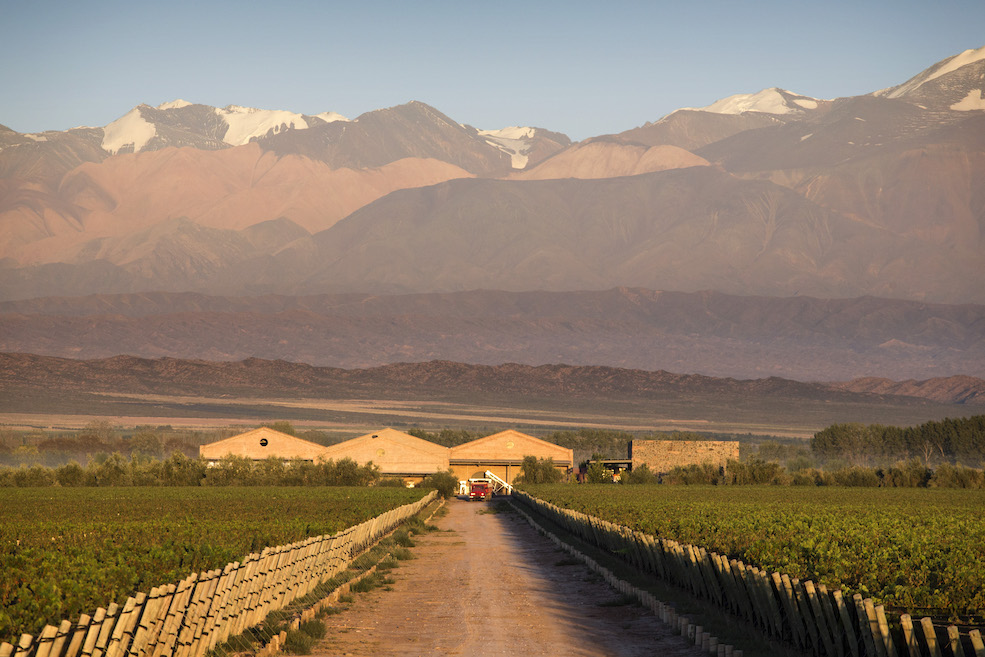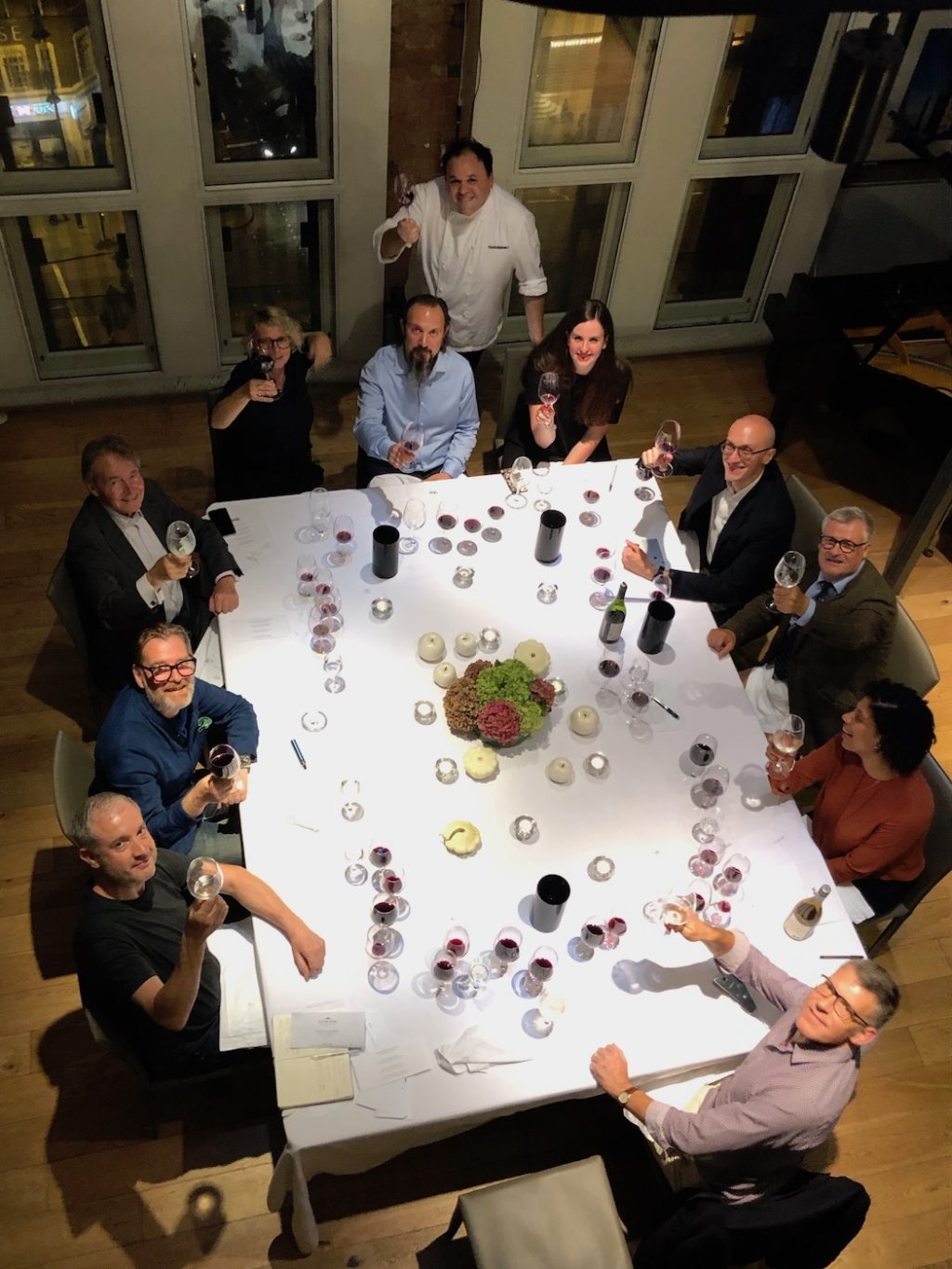
Where viticulture gets vertiginous: the wines of Chakana
With a name honouring the Southern Cross constellation that governed the Incas’ agricultural calendar, it seems only fitting that Chakana strives to be as close as possible to nature.
For the indigenous people of the Andes, the cross marked the centre of the universe and was apparently the sign of a non-material world. For Chakana’s winemaker, Gabriel Bloise, the name appears to have inspired the idea for a 21st century totem in a similar vein: to test the boundaries of what wine can live without.

“In our vision, we think that wine should be made only with grapes”, says Bloise (pictured centre, seated), risking an eye roll with a statement of the obvious that is actually rather more profound than it might at first sound. “In Argentina, there are a thousand things that we are allowed to add to a wine. We have challenged ourselves to go without, to make wine with the minimum intervention and without the addition of sulphur”.
This ‘less is more’ mission began in 2012, when Chakana started the conversion process to restore the health of its soils by switching to organic and biodynamic farming. The flagship 75-hectare Nuna estate in Luján de Cuyo has been certified organic since 2014, with biodynamic certification following two years later. Next, came conversion of Chakana’s 40 hectares in the high altitude Uco Valley vineyards of Altamira, where viticulture gets vertiginous, at more than a thousand metres.
With his perfectly manicured hipster goaty, Bloise is clearly passionate about getting down to earth, eschewing the quick fixes of modern agriculture, pesticides and fertilisers and the like, espousing instead the age-old techniques of farming organically, but is he really sure about adhering to what many see as the straitjacket of the biodynamic calendar?
… “if you do not know, don’t say no” …
“We do all that is needed to be certified by Demeter. Practically, we follow the calendar, because there is no doubt that the moon affects liquids. We must also make preparations and bury horns too, because if you do not know, don’t say no”.
Direction does not come exclusively from the night sky, however. Two stars of modern winemaking have also provided advice and support: Italian consultant Alberto Antonini and Chilean terroir expert Pedro Para. Their input appears to be reflected in both the palpable brightness of the wines and also their expression of the land from which they come. “Wine should be from a specific place, so we do not blend between regions”, Bloise insists.

Showing off the Chakana wines, for an exclusive dinner at Argentinian chef Martin Milesi’s ‘one table restaurant’ Una, under the St Pancras clock tower, it is clear that Bloise’s mission is still a work in progress: the positive reaction to the results of his experimental winemaking thus far stoking a desire to go still further.
The current renaissance for ancestral method fizz was not something Bloise felt he could ignore. Chakana Ayni Nature sparkling wine (RRP £16), 100% Pinot Noir from Altamira, with natural yeasts and spontaneous second fermentation in bottle, has enjoyed just seven months on lees. The colour of onion skin, it offers inviting, if slightly chunky, berry and cherry fruit, with red apple.
 Must
Musttry
Chakana Estate Selection Torrontes 2018 (RRP £17.99), an Uco Valley blend with bought-in grapes from a vineyard Bloise says he has “fallen in love with”, is a real moment of revelation. The intimate dining room falls silent, as those gathered savour it, before asking “is this really just Torrontes?” The grape’s high phenolics mean the oak used is 100% new, but it’s well integrated, with the wine revealing precision and dialled back floral charm with a lip-smacking saline streak.
Unlike Torrontes, I have always loved Bonarda – second only to Malbec in terms of plantings in Argentina, but still somewhat underrated over here. Sobrenatural Bonarda 2018 (vintage not yet available in the UK) is what Bloise describes as “a natural wine by technique, with no sulphur, no filtration, no nothing”. Some carbonic maceration is used “for roundness and drinkability”, with the wine showing lifted, bouncy blueberry and red cherry flavours, with a delicious purity of fruit.
Nuna Vineyard Malbec 2018 (RRP £14.99) from organic vines at an elevation of just under 1000 metres in Lujan de Cuyo is also fermented without sulphur. Fleshy and ripe, the quality of fruit shines bright, with plum, bramble and foraged blackberries.
Ayni “Gravas” 2018 (RRP £24.99), Chakana’s flagship wine, from organic wines at 1,100 metres in Altamira, with a year’s ageing in 100% new oak and no added sulphur. Young, bottled only 3 months ago, yet already offering sophisticated, juicy, ripe plum and blackcurrant flavours, with white pepper and cocoa. Just as so many of the Incas’ ideas live on, so this assured wine, with its high quality fruit and firm acidity, will age with aplomb.
Some of the above wines, including the Torrontes 2017 vintage, are available at Wine Direct and also in store at Fareham Wine Cellar and Fenwick’s.
A version of this piece first appeared in The Buyer.